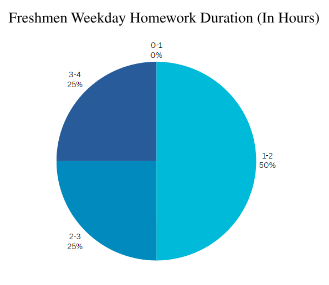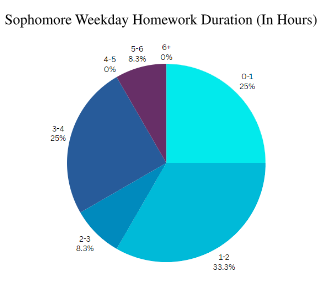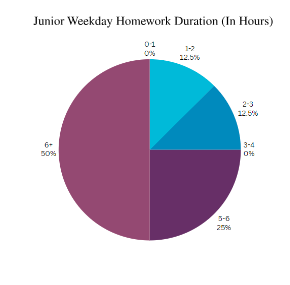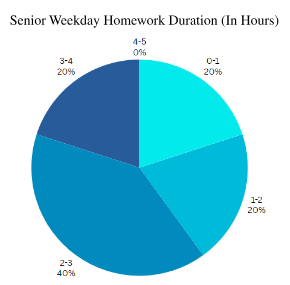Homework plays a large role in education, but how much time are high schoolers dedicating to homework daily, and how does it affect their mental health? A Google Form was sent out asking each grade about their experience with homework on weekdays and weekends.
Out of those who took the survey, freshmen reported having more than an hour of homework every day. One freshman noted, “Homework is annoying to do when I’m tired after getting home from school and practice.” Another student said: “It doesn’t allow me to do as much as I would want to outside of school.” While freshmen typically have less homework than other grades, it is a big shift to go from virtually no homework in middle school to hours a night.

According to the survey results, 33.3% of sophomores have about 1-2 hours of homework per weekday. 8.3% of students spend 5-6 hours each day. That means that if a student gets home at 3:15pm, and works for 5.5 hours straight, they wouldn’t be done until 8:45. Now imagine this student has extracurricular activities that last until 5:00. Now this student will be working until 10:30 at night! When asked how homework affects them, a sophomore replied, “There should be a separation between the place you rest and have your own life and the place you work and struggle.” A different student reported that they dread coming home since there is even more work to do. Many students already feel burdened by the workload during their sophomore year.

Additionally, about 50% of juniors spend more than 6 hours a day on homework. With this amount of homework, balancing extracurriculars is a challenge, especially when college requires you to excel in both. Junior year is when students normally take harder classes to impress colleges which could explain the increase in homework. One junior said, “it can impact my mental health when I have so much homework on the weekends because the weekends are for resting but almost every weekend I have so much homework that I can’t relax.” This is another example of the stress that homework adds to mental health. An increasing amount of homework with harder classes can be overwhelming to manage.

About 40% of seniors reported spending 2-3 hours on homework each night. Compared to the majority of juniors, the seniors have less homework. Although they have less homework, they are also submitting and working on college applications at the same time. One senior said, “I mean homework is a reality of school, but I wish it would skew more towards practice of in-class concepts rather than ‘learning’ things we are going to go over in class.” Another student commented that if the homework assignments feel unimportant then they procrastinate and it makes the homework process even longer.

We asked students what the appropriate amount of homework should be per night, and most students said 1-3 hours is reasonable. Because students expressed that homework lowered their mental health, many students want the time they spend on homework to be shorter than it is now. Overall, students shared that homework plays a significant role in their daily life and some students expressed frustration or dislike for homework. Students feel that homework could be changed to review in-class material and involve engaging assignments that don’t feel like busy work.


















